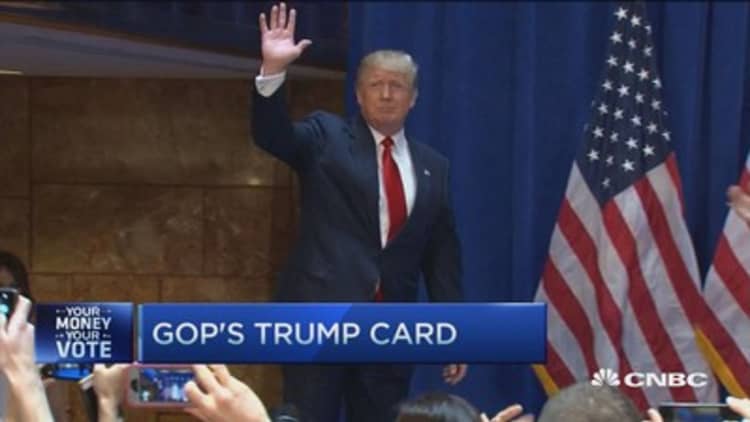Even before last week, when Donald Trump descended into the GOP presidential primary field, the reputation of the businessperson-cum-politician, or the "business experience" candidate, was up for debate.
Business experience has long been regarded a resumé booster on the campaign trail, particularly for Republican aspirants, premised on the thought that private sector success translates well into public governance. (This supposition certainly has its detractors, although voters still largely subscribe to it.)
But four years ago, Mitt Romney, running as a corporate fixer-upper, plainly proved the liability of this asset.
Romney's humbling defeat to President Barack Obama, at the hands of a populist, anti-Wall Street line of attack, made a cautionary tale for any future candidate who seeks to make pecuniary talent a campaign calling card. And although Romney opted not to run in 2016, the black box of his sunken ship still beeps in the background of the coming presidential race.
Can the asset be salvaged? Certainly, it can be improved upon.
"As a Republican, you have to have a narrative that talks about how you are actually doing work, how you are improving the lives of people," said Rick Wilson, a Florida-based GOP messaging consultant. "The value of the management asset associated with being in business has changed somewhat dramatically over time and that is difficult for Republicans. It used to be, 'He's a businessman, he has good values.'"
With the addition of Trump, and the anticipated candidacy of Ohio Gov. John Kasich, the current Republican primary will feature a quartet of contenders with past careers in finance or corporate America. It remains to be seen if any of them can do a better job than Romney in asserting the "business experience" raison d'être—or who among them will even try.
Jeb Bush has already been declared to have a "Mitt Romney problem," as Bloomberg Politics put it, due to his post-gubernatorial stint in offshore private equity.
Carly Fiorina, the former Hewlett-Packard CEO, lost her 2010 U.S. Senate bid amid a withering assault over her stewardship of the info tech giant.
Kasich, for his part, won the Ohio governor's race in 2010 despite his opponent's persistent attacks about his time at Lehman Brothers, where he served as a managing director until its collapse. He has since become a vocal critic of Wall Street's "greed," but has thus far refused to release his tax returns during his halcyon Lehman days.
And Trump is, well, Trump.
Read MoreTrump turns GOP race into reality-TV circus
Needless to say, there's a lot to pick at, and Democrats are already at it.
During her campaign kickoff speech, which themed generally on income inequality, Hillary Clinton also had specifics to say about American business; she uttered the word 14 times, according to the official transcript of the speech.
While Clinton warmly invoked her father's small drapery printing shop, and spoke of her campaign championing "small-business owners who took a risk," she noted the American public's distrust in big business and said, "Prosperity can't be just for CEOs and hedge fund managers."
A number of Republican operatives involved in the race expressed confidence that any effort by Clinton to Romney-cize their candidate or party in 2016, like Obama did in 2012, would be neutralized by the Clinton's own money-making over the last 15 years.
"It helps to have a presumptive nominee on the other side who is the epitome of the political class and the sort of reigning ideology of, this is due to me," Sarah Isgur Flores, Fiorina's deputy campaign manager, told CNBC.com.
It's worth noting the success Republicans enjoyed with a number of business-touting candidates in 2014, in both congressional and gubernatorial races. Perhaps the party's most impressive midterm victory was its takeover of Illinois, thanks to the self-funding financier, Bruce Rauner. (I previously wrote about Rauner's challenge in avoiding the Mitt Romney problem. Although the race went to a runoff, he ultimately prevailed.)
Read MoreThe returns are in: 2016 will be the Form 990 election
Intriguingly, Rauner's campaign manager, Chip Englander, is now managing the presidential campaign of Kentucky Sen. Rand Paul, who has positioned himself as a bur in Wall Street's saddle.

When I emailed Englander asking whether he thought the Bain attacks on Romney informed the current race, he replied, "Absolutely."
"For every Hillary Clinton making $100 million despite producing nothing of value, there are many who have made millions with just as little produced to show for it," Englander wrote.
Perhaps forgotten in the 2012 race is the Bain-baiting that Romney faced during the GOP primary, most notably from Rick Santorum and Newt Gingrich.
And one can already see a similar dynamic potentially playing out this cycle.
Consider just the jostling of the operatives among the "business experience" candidates themselves.
Recently, Fred Davis, a Republican strategist who made ads for Fiorina's 2010 Senate campaign, signed on to work for the super PAC supporting Kasich's presidential bid-to-come.
Davis was the brains behind Fiorina's infamous "demon sheep" ad, but since, the campaign has been critical of the candidate.
"I think business experience and an ability to accomplish great things is still a plus," Davis told CNBC.com. "I think the style of (Romney's) business, being somebody that comes in, often has to lay off employees, downsize, or break up businesses, that is unfortunate. And that applies to Carly Fiorina."
Davis said that a slate of attack ads, juxtaposing HP layoffs with Fiorina purchasing corporate jets for company executives, proved to be a "devastating combination."
With Fiorina currently a third-tier candidate, the attention and scrutiny of her business track record will likely be much less this cycle. She will have an opportunity, at least for the foreseeable future, to recast her business experience for the voting public.
"By and large, people understand when you make changes in large corporations you make enemies," Isgur Flores said.
As a fact of business and politics, that's most certainly true. As a presidential campaign slogan, on the other hand, it remains a work in progress.


